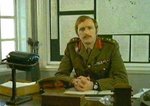renrich
Chief Master Sergeant
IF Japan had not attacked the US, the US would not have been in the war as soon as they were. IF Germany had not attacked Soviets but rather waited on defense (the Wehrmacht was excellent on defense.) Germany could have possibly worked out a compromise with Britain that would have ended the war. Hitler would probably have to contain his hatred for Jews. Lots of ifs. Once the US was in the war the outcome was foreordained.

